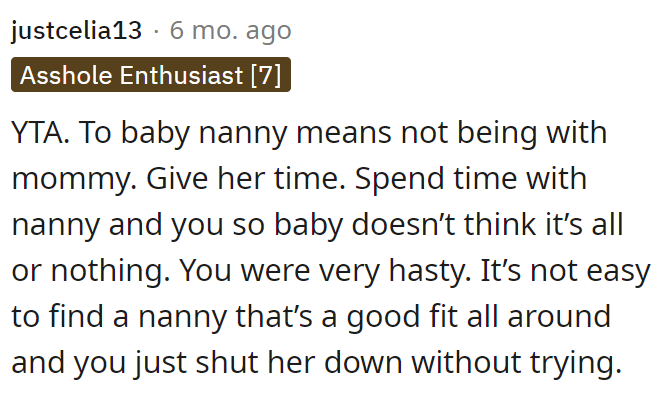
Woman Fires Nanny Because Her Baby Doesn't Like Her, Sparks Debate In House As Older Kids Love Her
"Our older 2 are pretty upset about this"

In the nuanced world of parenting, making decisions that affect the emotional well-being of children can be a Herculean task. This story revolves around a family and their beloved nanny, who had become a significant part of their lives over three years.
The protagonist of this tale, OP, faced a heart-wrenching decision when her youngest child, a one-year-old baby, began showing signs of discomfort with the nanny. The older children, aged seven and five, had formed a deep bond with the nanny, a testament to her dedication and affection.
However, the baby's behavior raised red flags for OP. Initially fond of the nanny, the baby's attitude shifted dramatically with age. She would cry when handed to the nanny, reach out for OP instead, and never willingly go to the nanny despite her inviting gestures.
This change in behavior was not just a momentary phase but a persistent pattern that left OP deeply concerned. The dilemma was not about any overt mistreatment; there were no signs of harm or neglect.
Yet, the baby's consistent distress was enough to make OP and her husband question the situation. After much deliberation, they decided to let the nanny go, prioritizing their baby's apparent unease.
This decision was not made lightly, given the affection and trust the family had for the nanny, especially the older children, who were understandably upset by her departure. OP's decision sparked a debate among her social circle.
Her mother and friends considered the action too harsh and hasty, arguing that there was no evidence of mistreatment. They suggested that the baby's behavior might not be a reliable indicator of the nanny's performance.
This feedback left OP questioning the fairness of their decision: Is it justifiable to replace a nanny based on a baby's unexplained discomfort?
OP asks:

, OP, faced a heart-wrenching decision when her youngest child, a one-year-old baby, began showing signs of discomfort with the nanny

The older children, aged seven and five, had formed a deep bond with the nanny, a testament to her dedication and affection.

The baby's consistent distress was enough to make OP and her husband question the situation

After much deliberation, they decided to let the nanny go, prioritizing their baby's apparent unease.

OP has offered the following explanation for why they think they might be the asshole:
I could be the asshole because I fired her without any evidence that she had done anything wrong. In fact, she was always great from what I saw.
And, right off the bat, Reddit goes judgemental:
 Reddit
RedditBabies do have favorite people.
 Reddit
Reddit
"You sacrificed your 2 kids' comfort for 1 baby. "
 Reddit
RedditOP was very hasty.
 Reddit
Reddit
Babies can be picky sometimes:
 Reddit
RedditHere is what a professional had to say:
 Reddit
Reddit
OP should be careful not to ruin her reputation.
 Reddit
RedditOP's decision to fire her nanny, based solely on her baby's apparent discomfort, has drawn a significant amount of criticism. The overwhelming consensus from the community feedback is that OP may have acted too hastily, overlooking the natural phases of child development.
Many pointed out that it's common for babies to exhibit a strong preference for their parents, especially when they are nearby. This behavior doesn't necessarily indicate any failing on the nanny's part.
Several comments emphasized the importance of understanding separation anxiety and attachment behaviors in babies. It's a normal part of development where children show a preference for their primary caregivers.
The suggestion that OP's baby simply wanted her mother instead of the nanny is a plausible explanation and one that doesn't warrant the dismissal of a trusted caregiver who had formed bonds with the other children in the family.
Moreover, there's a notable concern about the impact of this decision on the older children, who had developed a strong attachment to the nanny. By prioritizing the baby's preferences, which might be a temporary phase, OP has disrupted the stability and emotional security of her older children.
Damjan







